According to the Prime Minister, Vietnam has determined that it must integrate to catch up, progress together and surpass, but integration must not be at all costs, without dependence, but must be on the basis of mutual benefit.
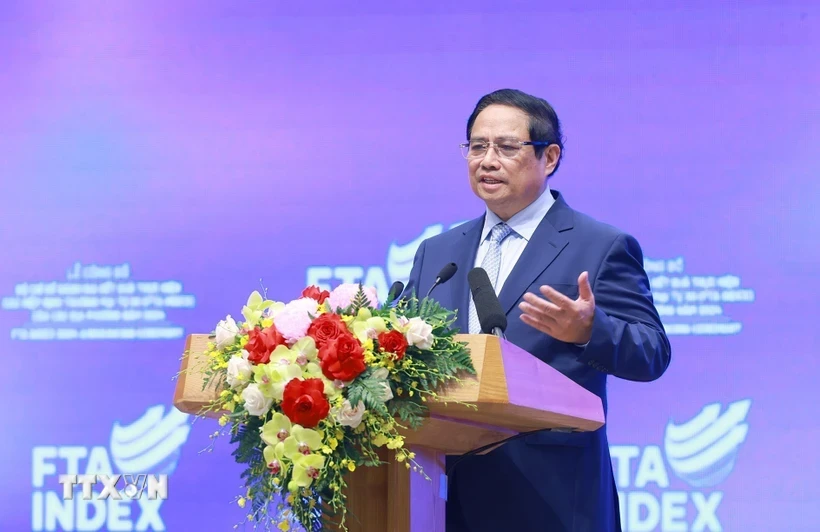
On the afternoon of April 8, Prime Minister Pham Minh Chinh attended the Ceremony to announce the Index for assessing the implementation results of Free Trade Agreements (FTA Index) of localities in 2024, held directly at the Government Headquarters and online to the bridge points of the People's Committees of 63 provinces and centrally-run cities.
Attending the event were Deputy Prime Minister and Minister of Foreign Affairs Bui Thanh Son; Minister of Industry and Trade Nguyen Hong Dien; leaders of ministries, branches and localities; ambassadors and representatives of international organizations in Vietnam; leaders of Vietnamese and foreign business associations in Vietnam.
FTA contributes to deeply integrating Vietnam's economy with the world
According to the World Trade Organization (WTO), by early 2025, there will be about 328 FTAs in effect, a sharp increase compared to 98 FTAs in 2000. To date, Vietnam has signed and implemented 17 FTAs with many major partners in the world. In particular, participation in new-generation FTAs such as CPTPP, EVFTA, UKVFTA has affirmed Vietnam's commitment to deep and comprehensive integration.
In his opening speech, Minister of Industry and Trade Nguyen Hong Dien said that the Government has assigned the Ministry of Industry and Trade to develop an annual index to assess the implementation results of Free Trade Agreements (FTA Index) nationwide to provide a transparent and objective database for the Government, central and local agencies in directing, supervising and operating integration work; supporting localities in assessing the implementation results of FTAs according to the proposed action program; and at the same time, it is the basis for planning policies and development strategies suitable to the conditions and potentials of each locality.
According to the survey and assessment of the results of implementing FTAs in localities that have been announced: Access to information about FTAs by Vietnamese enterprises has had certain successes in terms of breadth; enterprises have grasped the focal points at both the central and local levels in providing information about FTAs; the forms of providing FTA information in localities are quite diverse, reaching enterprises, from events, conferences, seminars, training to documents, portals/websites.
Along with that, the ability of enterprises to access legal documents implementing FTAs is guaranteed. Enterprises have begun to take advantage of incentives at different levels depending on the industry, locality and each agreement. Enterprises have initially recognized the commitments on sustainable development, especially commitments on labor and environmental commitments and have made certain preparations for implementing these commitments.
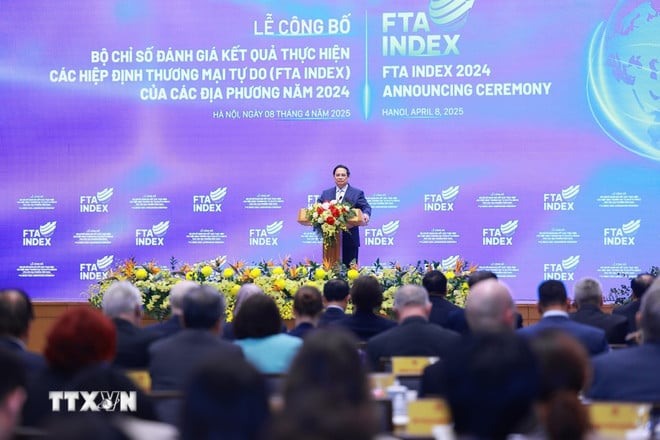
However, the level of interest and resources devoted to understanding and taking advantage of FTAs by enterprises is still not really high. The work of guiding or organizing guidance for enterprises on legal documents issued to implement FTA commitments by local State management agencies is still focusing on commitments related to rules of origin, preferential tariffs, not paying attention to deeper commitments in areas such as trade in services, intellectual property, labor, environment, etc.
Current measures have not yet fully met practical needs in the context of Vietnam's increasingly deep integration into the global supply chain; it is necessary to continue to improve and strengthen support policies to help businesses optimize costs, effectively use resources and improve competitiveness, especially in the context of strong digital transformation and the 4.0 industrial revolution...
Speaking at the event, Prime Minister Pham Minh Chinh affirmed that the FTA Index is a new, quantitative and systematic tool, developed and published for the first time based on a survey of enterprises in 63 provinces and cities nationwide, aiming to provide a transparent and objective database for the Government, central and local agencies in directing, supervising and operating integration work; at the same time, it is the basis for formulating policies and development strategies suitable to the conditions and potentials of each locality, contributing to export growth, towards sustainable exports.
The Prime Minister said that in implementing the Doi Moi process over the past 40 years, in addition to focusing on socio-economic development, environmental protection, strengthening national defense, security and social order and safety, Vietnam has always adhered to an independent, self-reliant, diversified and multilateral foreign policy, being a good friend and a responsible member of the international community, for peace, friendship, cooperation and development in the region and the world; building an independent, self-reliant economy, proactively and actively integrating internationally.
After 80 years of independence, Vietnam has maintained national independence, sovereignty, unity, and territorial integrity; ensuring the people's right to live, the right to freedom, and the right to pursue happiness. During that process, Vietnam has experienced countless difficulties and challenges, from the ruins of war that have not yet been fully overcome, enduring a long-term embargo, carrying out the renovation process from almost nothing, with a GDP of only about 4 billion USD, a GDP per capita of about 100 USD, nearly 70% of the population being poor...
With the spirit of self-reliance, self-reliance, self-confidence, national pride, and the support, assistance, and cooperation of international friends, Vietnam has risen up and achieved many important achievements. To date, Vietnam's GDP has reached 470 billion USD, with GDP per capita equivalent to 4,700 USD.
Vietnam has determined that it must integrate to catch up, progress together and surpass, but integration must not be at all costs, without dependence, but must be on the basis of mutual benefit, harmonious interests, and shared risks. In which, export is an important driving force, but not the only driving force; in export, there are not only a few markets but all countries and partners in the world.
Most recently, the Politburo issued Resolution No. 59/NQ-TW on international integration in the new situation, which identified international integration as "a form and high level of development of international cooperation," an important driving force to maintain peace and stability, take advantage of external conditions and resources for development and enhance the role and position of the country.
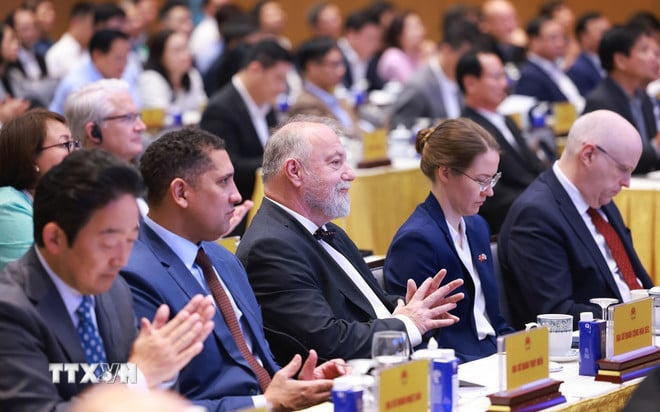
Vietnam identifies international economic integration - especially through FTAs - as an important gateway connecting Vietnam with the world, bringing the economy closer to global standards. To date, Vietnam has signed and implemented 17 FTAs with more than 60 partners, covering all continents. This demonstrates Vietnam's commitment to trade liberalization, fair competition and sustainable development.
The Prime Minister emphasized that the effective implementation and enforcement of FTAs is not only to seriously implement the international commitments that Vietnam has made, but also to be a driving force for domestic reforms, expanding the market for goods and services, and improving the competitiveness of the economy.
According to the Prime Minister, in recent times, international economic integration and participation in FTAs have made important contributions to the realization of Vietnam's socio-economic development goals. In particular, economic growth has been maintained at a high level, the economic scale has been increasingly expanded; the macro-economy has been basically stable, inflation has been controlled, major balances of the economy and social security have been ensured; and people's lives have been constantly improved.
The trade balance shifted from deficit to surplus, the export market expanded, and exports grew steadily over the years. Foreign investment increased, becoming an important driving force for development.
Overcoming challenges in world trade
Besides these achievements, the process of international economic integration still faces many difficulties and obstacles, posing many new challenges such as: Awareness of the meaning, role, importance, opportunities and challenges of participating in FTAs, especially at the local level, is not really good; the competitiveness of the economy, enterprises and products is still weak; taking advantage of opportunities from FTAs is not really effective; policies to support enterprises, especially the private sector, still have certain limitations; international economic integration is not really closely linked with the requirements of improving the quality, efficiency and sustainable development of the economy.
The Prime Minister said that the FTA Index is an important tool to measure the level of implementation and utilization of FTAs by localities, thereby contributing to building a basis for the National Assembly, the Government and ministries and branches to comprehensively assess strengths and weaknesses in the process of implementing FTAs.
The FTA Index also reflects the effectiveness of business support policies, demonstrating the coordination between the central and local governments. Thereby, agencies can develop appropriate policies to optimize benefits from FTAs, especially when the agreements are increasingly comprehensive and have a profound impact on the economy. The FTA Index assesses the effectiveness of implementing international commitments at the local level and contributes to promoting growth momentum, especially export and investment momentum.
Appreciating the efforts of the Ministry of Industry and Trade, ministries, branches, localities and relevant agencies in developing and announcing the FTA Index 2024 - the first time building and announcing this important index, Prime Minister Pham Minh Chinh pointed out that Vietnam is entering a new era - an era of striving to develop a rich, civilized and prosperous nation, where the aspiration for prosperity, standing shoulder to shoulder with the world powers, becomes the guiding principle for all actions.
Vietnam promotes rapid but sustainable development; strives to become a high-income developed country by 2045, with a growth target of 8% in 2025 and double digits in the following years. Vietnam is renewing traditional growth drivers, promoting new growth drivers; focusing on 3 strategic breakthroughs in institutions, infrastructure, and human resource training.
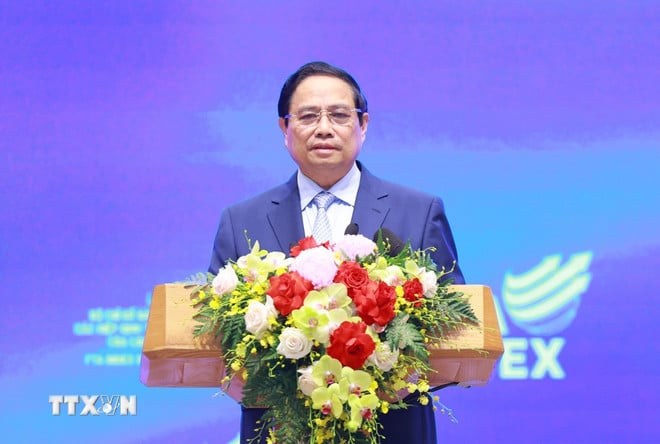
According to the Prime Minister, Vietnam is facing both great opportunities and significant challenges from the international economic integration process in the context of complex and unpredictable developments in the world and the region, requiring flexible, timely and effective adaptation. Effectively exploiting FTAs is an important way to maintain growth and enhance Vietnam's position in the international arena. This is not only the responsibility of the Government but also requires the cooperation of ministries, branches, localities, business communities and industry associations. Therefore, the Prime Minister requested that agencies and localities closely coordinate with the Ministry of Industry and Trade to perfect this tool, serving the country's long-term economic and trade strategy.
The Prime Minister said the Government will continue to promote solutions to maximize benefits from signed FTAs, improve the quality of implementing international commitments, expand markets and sign new FTAs with potential partners; and diversify markets and supply chains.
Considering that the context of free trade is facing difficulties and challenges; to implement Resolution 59 of the Politburo, the Prime Minister requested ministries, branches and localities to promote the implementation of 3 strategic breakthroughs; deploy the arrangement and streamlining of the apparatus; reduce harassment, inconvenience and compliance costs; restructure production and export towards digitalization and greening; and achieve rapid and sustainable growth.
Wishing that businesses must restructure the market and production and business, the Prime Minister said that the Government, ministries and branches continue to focus on researching policies, doing planning work; negotiating to expand the market; ensuring equal access for businesses to policies and resources; ensuring intellectual property rights and preventing fraud of goods origin; proposing to expand visa exemption for a number of suitable countries; ministries, branches and localities must coordinate with businesses and embassies to connect our country's economy with the world and businesses.
Proposing that international friends continue to cooperate, support and assist Vietnam in the integration process, including effectively implementing FTAs, Prime Minister Pham Minh Chinh hopes and believes that with a methodical strategy, close coordination and effective support tools such as the FTA Index, the benefits from FTAs will be exploited to the maximum, contributing significantly to promoting more sustainable economic development, achieving greater achievements in international economic integration, contributing to the socio-economic development of the country in the new development stage.
At the event, the Organizing Committee awarded Certificates of Merit to provinces and cities with achievements in evaluating the implementation results of Free Trade Agreements in 2024./.
Source









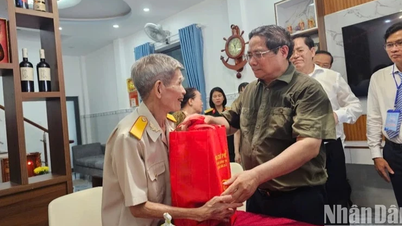




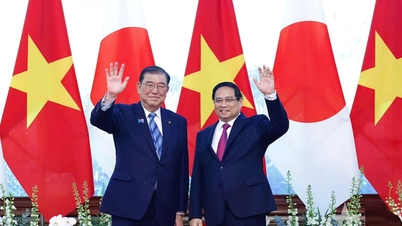


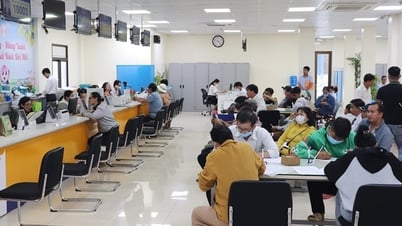

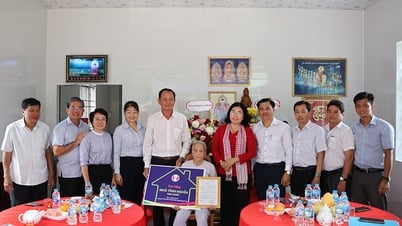
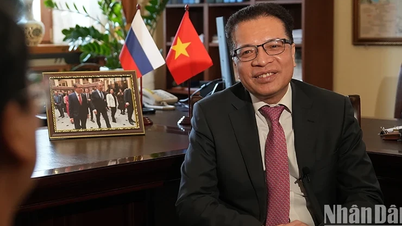

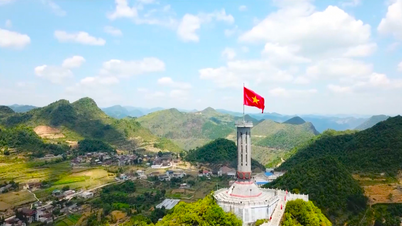




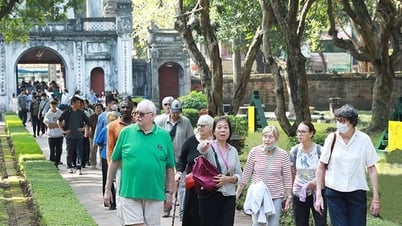
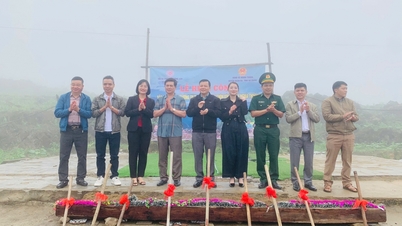
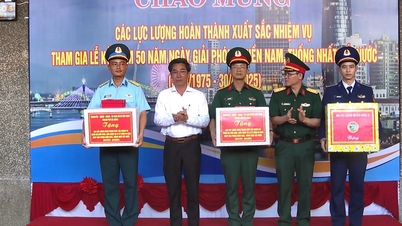

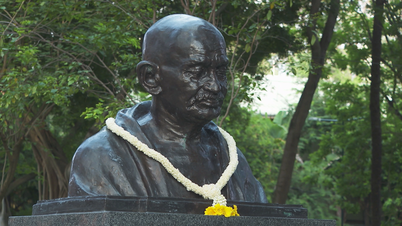


![[Photo] Thousands of Buddhists wait to worship Buddha's relics in Binh Chanh district](https://vphoto.vietnam.vn/thumb/1200x675/vietnam/resource/IMAGE/2025/5/3/e25a3fc76a6b41a5ac5ddb93627f4a7a)

















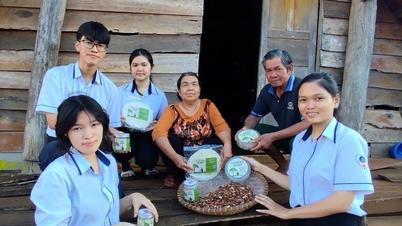












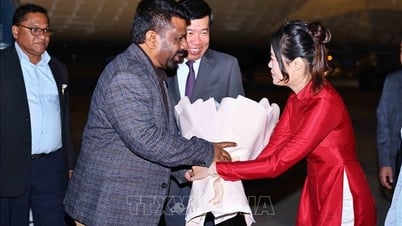
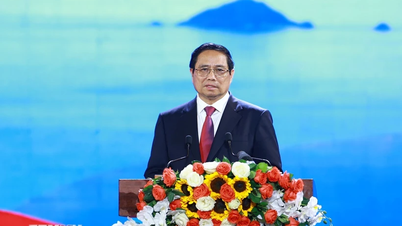

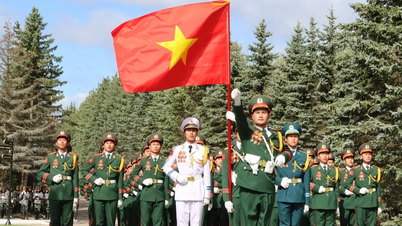

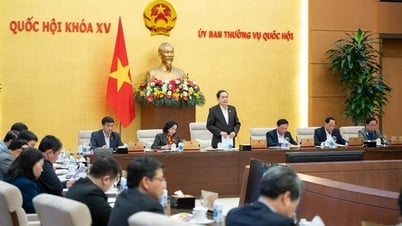

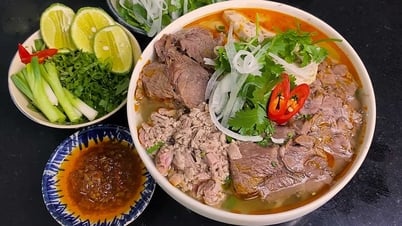
















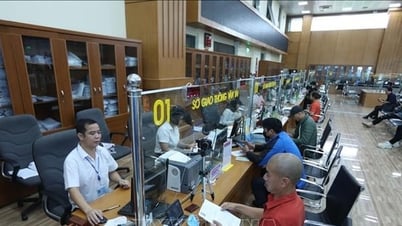
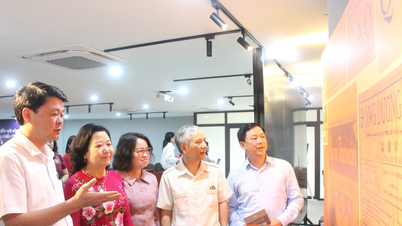









Comment (0)